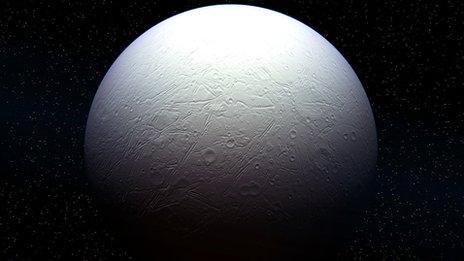Further away planets 'can support life' say researchers
- Published

Earth-sized planets could support life at least 10 times further away from stars than thought, researchers have claimed.
The University of Aberdeen team, which included academics from the University of St Andrews, said cold rocky planets thought uninhabitable might be able to support life beneath the surface.
They hope the study will influence other researchers.
Their paper is published in Planetary and Space Science.
PhD student Sean McMahon explained: "A planet needs to be not too close to its sun but also not too far away for liquid water to persist, rather than boiling or freezing, on the surface.
"But that theory fails to take into account life that can exist beneath a planet's surface.
"As you get deeper below a planet's surface, the temperature increases, and once you get down to a temperature where liquid water can exist - life can exist there too."
The team created a computer model that estimates the temperature below the surface of a planet of a given size, at a given distance from its star.
'Go deeper'
Mr McMahon continued: "The deepest known life on Earth is 5.3km below the surface, but there may well be life even 10km deep in places on Earth that haven't yet been drilled.
"Using our computer model we discovered that the habitable zone for an Earth-like planet orbiting a sun-like star is about three times bigger if we include the top five kilometres below the planet surface.
"The model shows that liquid water, and as such life, could survive 5km below the Earth's surface even if the Earth was three times further away from the sun than it is just now.
"If we go deeper, and consider the top 10km below the Earth's surface, then the habitable zone for an Earth-like planet is 14 times wider."
He added: "The results suggest life may occur much more commonly deep within planets and moons than on their surfaces.
"This means it might be worth looking for signs of life outside conventional habitable zones.
"I hope people will study the ways in which life below the surface might reveal itself.
"Earth might even be unusual in having life on the surface."